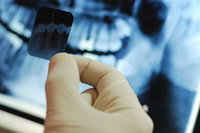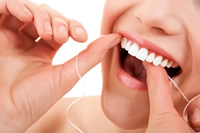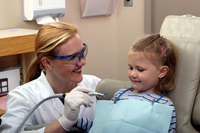General Dentistry
Preventive Dentistry
 While many people dread going to the dentist, proper dental care does not have to include complex, painful procedures. Patients can minimize their visits to the dentist with preventive dentistry. Preventive dentistry is the best protection against gum disease, tooth loss, and other dental conditions. Preventive dentistry requires a collaborative effort between patient and doctor to ensure proper care each and every day.
While many people dread going to the dentist, proper dental care does not have to include complex, painful procedures. Patients can minimize their visits to the dentist with preventive dentistry. Preventive dentistry is the best protection against gum disease, tooth loss, and other dental conditions. Preventive dentistry requires a collaborative effort between patient and doctor to ensure proper care each and every day.
Preventive dentistry helps patients avoid the costly and invasive procedures that are often needed for serious dental conditions. Maintaining dental health helps patients look and feel their best and can positively affect their overall health as well.
Preventing dental conditions requires a lifelong commitment that usually begins with the appearance of the first tooth. Children should see a dentist shortly after this to begin developing proper dental hygiene habits. Parents play an important role in helping their children develop and maintain these habits throughout childhood and early adulthood.
Regular Cleanings
Comprehensive dental exams and cleanings are recommended once every six months for all patients. These visits help identify any tooth decay or early signs of gum disease or oral cancer through diagnostic X-rays and physical examination. Early detection of these conditions can help ensure effective treatment and prevent permanent damage.
Regular cleanings help keep teeth clean and healthy through thorough exams provided by a certified dental hygienist. A dental cleaning includes removal of tartar and plaque, which can buildup and cause inflammation and disease if left untreated. The teeth are also polished during a cleaning to remove stains and further buildups of plaque that may not be removed during regular tooth brushing.
At-Home Dental Hygiene
 In order to ensure a happy and healthy smile, patients must take an active role in their dental care. This involves brushing your teeth at least twice a day, especially before going to bed at night. The ADA recommends brushing for at least two minutes with a soft bristle toothbrush and toothpaste to clean every surface of each tooth.
In order to ensure a happy and healthy smile, patients must take an active role in their dental care. This involves brushing your teeth at least twice a day, especially before going to bed at night. The ADA recommends brushing for at least two minutes with a soft bristle toothbrush and toothpaste to clean every surface of each tooth.
It is also recommended to floss at least once each day to clean the spaces between the teeth and under the gums. This prevents plaque from forming and prevents permanent damage to the gums, teeth and bone. Rinsing your mouth with water should be done after brushing, flossing and all meals if possible. Over-the-counter mouthwashes are often helpful in freshening breath and protecting the mouth from disease as well.
Eating balanced meals and reducing the number of snacks you eat can also help improve your dental hygiene. Other home dental aids are also available to help keep teeth as healthy as possible in between visits to the dentist. Your doctor will provide you with specific instructions on how to care for your teeth at home. It is important to follow these instructions to ensure good dental health.
Dental Sealants
Dental sealants are thin, plastic coatings that are applied to the surface of the tooth to protect the grooves of the teeth from decay and other diseases. Decay often begins in these grooves because they are hard to clean and susceptible to a buildup of plaque. Sealants create a smooth surface that fills deep grooves and makes the tooth easier to clean.
Sealants are applied in children once the six-year molars are present, or any time between the ages of 6 and 16. Adults may also benefit from sealants, especially when tooth surfaces have deep grooves or depressions that may be difficult to clean. Sealants are applied by cleaning the selected tooth and then painting the sealant onto the tooth enamel, where it will harden and bond to the tooth and protect it from decay. This procedure takes just a few minutes and is painless.
There is no one method for protecting your teeth from disease and decay. It is important to take care of your teeth each and every day, and to seek professional cleanings on a regular basis. With the help of an experienced dentist, many patients do not need further dental treatment and can successfully maintain their dental health with these simple steps.
Pediatric Dentistry
 Dental appointments for children are important not only to evaluate tooth and gum health but also to educate the young patient in how to prevent dental problems and maintain a healthy smile throughout his or her life.
Dental appointments for children are important not only to evaluate tooth and gum health but also to educate the young patient in how to prevent dental problems and maintain a healthy smile throughout his or her life.
During a check-up we will evaluate:
- How many teeth are and should be present
- Loose teeth
- Cavities
- Gum health
- Bite and oral habits
- Tongue and speech
- Fluoride use
- Diet and health history
- Home care and prevention
We will also speak with the parent(s), guardian(s) or accompanying adult(s) about how to care for the child's teeth and answer any questions they may have.
For more information about General Dentistry or to schedule an appointment, feel free to fill out our convenient contact form or call us directly at 212-935-9300.

